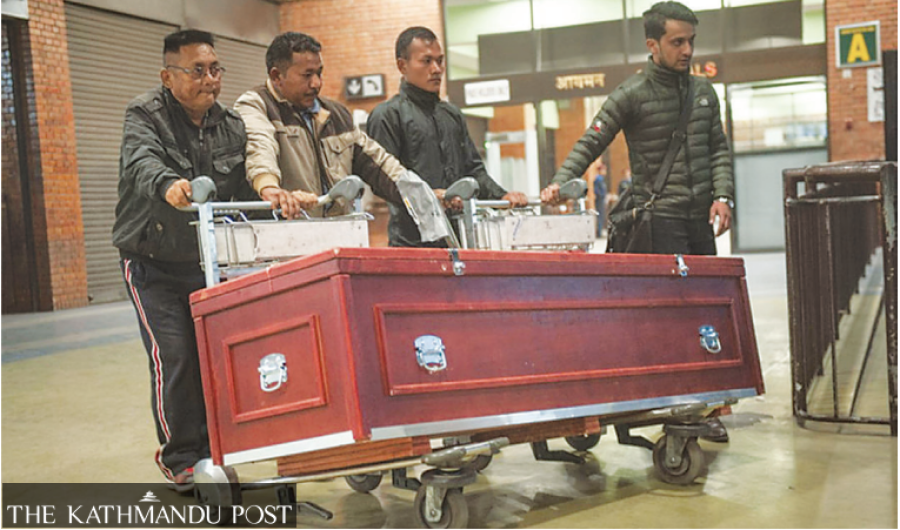Editorial
A one-way ticket
For most migrant workers, it’s a life lived without appreciation, and in death, without dignity.
Nepalis leaving their home country in search of foreign employment isn't new information, nor is the fact that scores have perished in the performance of their duties. Every day, approximately 1500 people fly out of Nepal to better the family prospects they leave behind. Despite being declared of sound health before flying out, 7,467 migrant workers from Nepal were brought back in coffins between 2008 and 2019. This grim statistic does not entirely reflect the entire picture; the number of deaths does not take particularly into account the undocumented migrant workers.
Most deaths are attributable to working in extreme conditions for a pittance; the natural tendency of holding the destination country accountable stands valid. But what measures have the government of Nepal taken to ensure its citizens are not exploited and exposed to dangerous working conditions? The authorities should not need reminding that they must provide for the well-being of all of its citizens abroad, especially those most vulnerable to abuse and exploitation. It seems that ensuring the protection of citizens exist only on paper. The poor monitoring track record has encouraged some unscrupulous employers in destination countries to avoid providing a minimum adequate working environment.
The migrant workers suffer humiliation not just in life but in death too. Even a minimum requirement of conducting an autopsy seems a task too arduous for the Nepali government. An autopsy to establish the cause of death is as essential as the protection the government vows to provide in life. Because in some cases, the cause of death arrived at by the destination country has proven to be untrue, and this does little to alleviate the grieving families as it robs them of closure after the loss of a loved one. There are also instances of missing organs which can only be categorised as theft, which has been harvested without the approval of the deceased for some unknown beneficiary.
For most migrant workers, it's a life lived without appreciation, and in death, without dignity. They work for a pittance in the most arduous of conditions without much complaint, and in return, all they probably desire is the satisfaction of seeing their family back home prosper. For they know too well that if they don't provide, the self-serving politicians who pursue their vested interest wouldn't. Most of these deaths are avoidable only if the government cared a little but let's be realistic in our expectations from those at the helm.
Lest we forget it, the remittance money sent by millions of migrant workers keeps the economy afloat; a staggering 27 percent of the GDP at its peak in 2015, as per a report by the World Bank. And instead of gratitude, all that they get is thanklessness. Is it much to expect for a sustainable working environment in Nepal? The policies to generate jobs in Nepal aren't a priority. Well, at least secure the goose that lays the golden eggs.




 9.7°C Kathmandu
9.7°C Kathmandu














